Related Research Articles

The American Film Institute (AFI) is an American nonprofit film organization that educates filmmakers and honors the heritage of the motion picture arts in the United States. AFI is supported by private funding and public membership fees.

Paul Leonard Newman was an American actor, film director, racing driver, philanthropist, and entrepreneur. He was the recipient of numerous awards, including an Academy Award, a BAFTA Award, three Golden Globe Awards, a Screen Actors Guild Award, a Primetime Emmy Award, a Silver Bear, a Cannes Film Festival Award, and the Jean Hersholt Humanitarian Award.
The Academy Award for Best Documentary Feature Film is an award for documentary films. In 1941, the first awards for feature-length documentaries were bestowed as Special Awards to Kukan and Target for Tonight. They have since been bestowed competitively each year, with the exception of 1946. Copies of every winning film are held by the Academy Film Archive.

Antonia: A Portrait of the Woman is a 1974 documentary about symphony conductor Antonia Brico, including her struggle against gender bias in her profession. The film was directed by Judy Collins and Jill Godmilow. It was nominated for an Academy Award for Best Documentary Feature.
Dudley Nichols was an American screenwriter and film director. He was the first person to decline an Academy Award, as part of a boycott to gain recognition for the Screen Writers Guild; he would later accept his Academy Award for Best Original Screenplay in 1938.
Robert Douglas Benton is an American screenwriter and film director. A seven-time Academy Award nominee and three-time winner, he is best known as the writer and director of the film Kramer vs. Kramer, for which he won the Academy Award for Best Director and the Academy Award for Best Adapted Screenplay. He later won a third Academy Award in the category of Best Original Screenplay for Places in the Heart (1984). His first script as a writer was written with David Newman for the 1967 film Bonnie and Clyde.
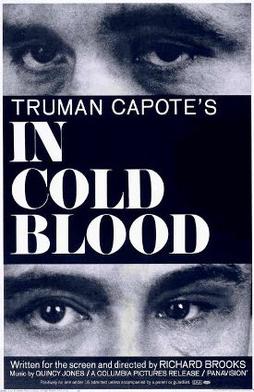
In Cold Blood is a 1967 American neo-noir crime film written, produced and directed by Richard Brooks, based on Truman Capote's 1966 nonfiction novel of the same name. It stars Robert Blake as Perry Smith and Scott Wilson as Richard "Dick" Hickock, two men who murder a family of four in Holcomb, Kansas. Although the film is in parts faithful to the book, Brooks made some slight alterations, including the inclusion of a fictional character, "The Reporter". The film was shot on location at sites where Smith and Hickock's crimes occurred, including the real Clutter home where they robbed and murdered all four members of the family. The film was nominated for four Academy Awards: Best Director, Best Original Score, Best Cinematography, and Best Adapted Screenplay. In 2008, In Cold Blood was selected for preservation in the United States National Film Registry by the Library of Congress as being "culturally, historically, or aesthetically significant".
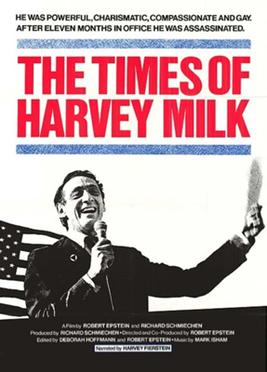
The Times of Harvey Milk is a 1984 American documentary film that premiered at the Telluride Film Festival, the New York Film Festival, and then on November 1, 1984, at the Castro Theatre in San Francisco. The film was directed by Rob Epstein, produced by Richard Schmiechen, and narrated by Harvey Fierstein, with an original score by Mark Isham.
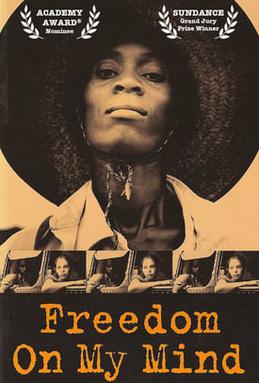
Freedom on My Mind is a 1994 feature documentary film that tells the story of the Mississippi voter registration movement of 1961 to 1964, which was characterized by violence against the people involved, including multiple instances of murder.
Battle for Life is a nature documentary series made from 1932 until 1934 by Horace Woodard and Stacy Woodard, The short films include the 1935 Oscar award-winning City of Wax, about honey bees. The one-reel short films were released by Educational Pictures. A homemade camera setup for closeups was used. The Woodards followed the series with another series titled Struggle to Live.

Ama Girls is a 1958 American short documentary film produced by Ben Sharpsteen. It was part of Disney's People & Places series. It won an Oscar at the 31st Academy Awards in 1959 for Documentary Short Subject. It is also known as Japan Harvests the Sea. It depicts the lives of ama divers, Japanese women who dive for pearls.
A Year Toward Tomorrow is a 1966 American short documentary film about the Volunteers in Service to America, directed by Edmond Levy. In 1967, it won an Oscar for Documentary Short Subject at the 39th Academy Awards.
The Redwoods is a 1967 American short documentary film produced by Trevor Greenwood and Mark Jonathan Harris. It was produced for the Sierra Club as part of their campaign for a national park to protect the redwood forest. In 1968, it won an Oscar at the 40th Academy Awards for Documentary Short Subject.
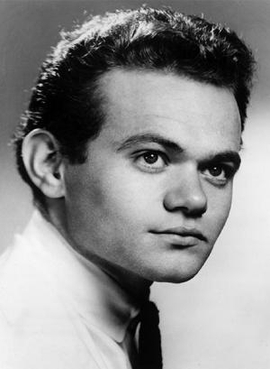
David Winters was an English-born American actor, dancer, choreographer, producer, distributor, director and screenwriter. At a young age, he acted in film and television projects such as Lux Video Theatre,Naked City; Mister Peepers,Rock, Rock, Rock, and Roogie's Bump. He received some attention in Broadway musicals for his roles in West Side Story (1957) and Gypsy (1959). In the film adaptation of West Side Story (1961) he was one of the few to be re-cast. It became the highest grossing motion picture of that year, and won 10 Academy Awards, including Best Picture.
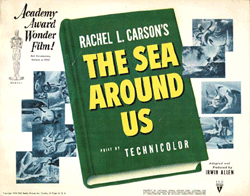
The Sea Around Us is a 1953 American documentary film written and produced by Irwin Allen, based on the book of the same name by Rachel L. Carson. It won the Academy Award for Best Documentary Feature.
The Face of a Genius is a 1966 American documentary film about Eugene O’Neill, produced by Alfred R. Kelman for WBZ-TV Boston. It was nominated for an Academy Award for Best Documentary Feature, the first time that a film originally produced for television was recognized by the Academy as a nominee for Best Documentary Feature.
Seeing Red is a 1983 American documentary film directed by Jim Klein and Julia Reichert.
Rembrandt: A Self-Portrait is a 1954 American short documentary film about the artist Rembrandt produced by Morrie Roizman, a former editor for The March of Time. This film shows a series of Rembrandt's artwork, including painting and drawings spanning his entire life and being shown as related of events throughout his life are narrated.
Monument to the Dream is a 1967 American short documentary film about the Gateway Arch National Park directed by Charles Guggenheim and narrated by Paul Richards. At the time of the film's production, the park was known as the Jefferson National Expansion Memorial. It was nominated for an Academy Award for Best Documentary Short.
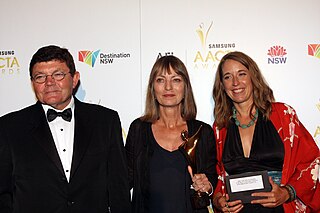
Bob Connolly is an Australian film director, cinematographer and author. He is best known for his documentaries produced over the past 30 years, including The Highlands Trilogy and Rats in the Ranks. More recent films include Facing the Music (2001) and Mrs Carey's Concert (2011). His films have won an Academy Award nomination, AFI Awards, and Grand Prix at the Cinéma du Réel Festival.
References
- ↑ "NY Times: Harvest". Movies & TV Dept. The New York Times . 2011. Archived from the original on May 21, 2011. Retrieved November 9, 2008.
- ↑ "The 40th Academy Awards (1968) Nominees and Winners". oscars.org. Retrieved June 1, 2019.
- ↑ "National Archives NextGen Catalog". catalog.archives.gov. Retrieved April 14, 2024.